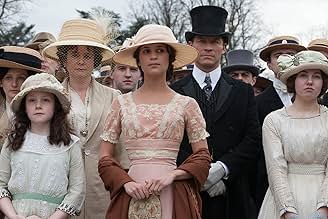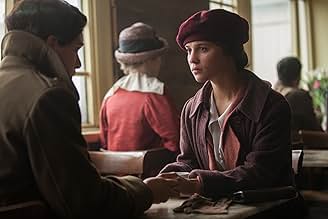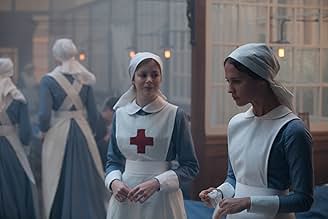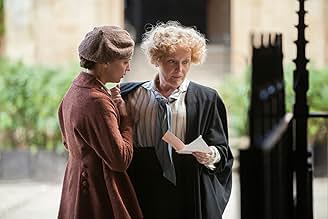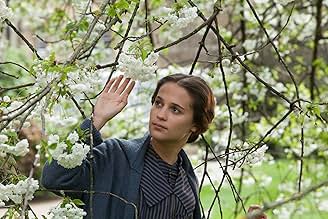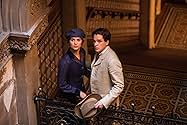VALUTAZIONE IMDb
7,2/10
31.372
LA TUA VALUTAZIONE
Una donna britannica ricorda la gioventù durante la prima guerra mondiale: una storia d'amore, la futilità della guerra e come dare un senso ai tempi più brutti.Una donna britannica ricorda la gioventù durante la prima guerra mondiale: una storia d'amore, la futilità della guerra e come dare un senso ai tempi più brutti.Una donna britannica ricorda la gioventù durante la prima guerra mondiale: una storia d'amore, la futilità della guerra e come dare un senso ai tempi più brutti.
- Regia
- Sceneggiatura
- Star
- Premi
- 5 vittorie e 7 candidature totali
Recensioni in evidenza
23 January 2015 Film of Choice at The Plaza Dorchester Tonight - Testament of Youth. Based on the book by Vera Brittain which is a best selling account of her experiences during the First World War, this film follows the life of Vera herself during those harrowing times. Starting out gently, we follow Vera, her brother and his friends from their comfortable life in the country to the eve of the war in 1914 and beyond. I say gently because this film eases you into what was one of the horrors of recent history, a time which shattered people and ruined lives forever. After fighting so hard to get to Oxford, Vera then gives it all up to become a nurse, a journey which ultimately takes her to France and gives her first hand experience of the massacre that war dishes out. There is a romantic thread running through the film but her strongest bond is with her brother and her world is torn apart when he signs up to fight. Vera was played beautifully by Alicia Vikander, a Swedish actress who I am not familiar with, but she had look of Emily Blunt in her facial expressions and mannerisms, and unfortunately did not seem to age at all during the film, not even in grief. However that is my only criticism in an elegantly shot film even when covering the abomination that is war. Another cinematic experience to make you think.
I remember being given this book as a set text for an English A-Level examination over 30 years ago and am aware that there was a prestigious BBC production of it also several years back but this is the first dramatisation I've seen of Vera Brittain's novel documenting her own experiences in that golden age of post-Edwardian pre WW1 England when for coming-of-age birthdays you got given a piano from your father. That's if you were a girl of course, her more musically gifted brother conversely gets what she would have wanted, a scholarship at Oxford although on the other hand he is also at the the prime age to be called up for what he and most everyone else (but not their knowing father) believes will be a short, heroic and clean war which of course it turned out not to be (apart from the heroic part).
Young Vera is headstrong, not only about wanting to make her own way in a man's world (female emancipation was still years away), but later about making her own contribution to the war effort by enrolling as a nurse while her lover, brother and other male friends are fighting in the trenches. Told wholly from her point of view, it's an entertaining if not enthralling watch, beautifully shot and well acted if somehow just lacking some extra pathos to really capture the hellish undertow of the War to end all Wars.
Alicia Vikander is appealing as the vaguely tomboyish, intellectual Vera. In those days, it would appear, the golden youth had to be chaperoned everywhere by a usually imposing maiden aunt figure and make their feelings about each other known by writing and sending poems as the film strives to contrast the idyllic pre-war days of carefree swimming and carousing with the bleakness and destruction of war itself. For me, I didn't feel the contrast quite sharply enough and my abiding memories of the film are of the big family house and the dreaming spires of Oxford rather than the hell of the makeshift military hospitals and muddy and bloody trenches on the front line.
The best shot for me was when I perhaps detected a tribute to all-time great movie "Gone With The Wind" as Vera goes Scarlett-like amongst the wounded and dying, searching for her wounded brother where the camera ascends into a sweeping dolly shot showing the full extent of the number of the casualties, just like Vincent Fleming's rightly famous take all those years ago.
The supporting actors are picked from the familiar directory of experienced British character actors, notably Miranda Richardson and Emily Watson, while the young actors in the leads, all of them unfamiliar to me, perform with aplomb.
There is a great true-life story to be told here and this film does so respectfully and responsibly, if just a little too carefully at times.
Young Vera is headstrong, not only about wanting to make her own way in a man's world (female emancipation was still years away), but later about making her own contribution to the war effort by enrolling as a nurse while her lover, brother and other male friends are fighting in the trenches. Told wholly from her point of view, it's an entertaining if not enthralling watch, beautifully shot and well acted if somehow just lacking some extra pathos to really capture the hellish undertow of the War to end all Wars.
Alicia Vikander is appealing as the vaguely tomboyish, intellectual Vera. In those days, it would appear, the golden youth had to be chaperoned everywhere by a usually imposing maiden aunt figure and make their feelings about each other known by writing and sending poems as the film strives to contrast the idyllic pre-war days of carefree swimming and carousing with the bleakness and destruction of war itself. For me, I didn't feel the contrast quite sharply enough and my abiding memories of the film are of the big family house and the dreaming spires of Oxford rather than the hell of the makeshift military hospitals and muddy and bloody trenches on the front line.
The best shot for me was when I perhaps detected a tribute to all-time great movie "Gone With The Wind" as Vera goes Scarlett-like amongst the wounded and dying, searching for her wounded brother where the camera ascends into a sweeping dolly shot showing the full extent of the number of the casualties, just like Vincent Fleming's rightly famous take all those years ago.
The supporting actors are picked from the familiar directory of experienced British character actors, notably Miranda Richardson and Emily Watson, while the young actors in the leads, all of them unfamiliar to me, perform with aplomb.
There is a great true-life story to be told here and this film does so respectfully and responsibly, if just a little too carefully at times.
The centenary of the outbreak of what was at the time called The Great War, and came later to be known as The First World War, led to an outpouring of commemorative and cultural events. This explains the timing of "Testament Of Youth" which in fact is based on the famous first instalment of the memoirs of Vera Brittain (1893-1970) which was published as long ago as 1933 and is still in print. It is both a tale of tragic loss as young, idealistic men volunteer for the slaughter fields of France and Belgium and an account of an intelligent young woman's efforts to obtain a university education and make her independent way in the world.
There is a fine ensemble cast of established and new British actors, but the central role is the subject of a surprise and bold piece of casting as the Swedish actress Alicia Vikander plays the quintessentially British Brittain. However, Vikander gives a luminous performance and she is clearly destined for a very successful career. There is a sense of authenticity in having a female scriptwriter Juliette Towhidi to turn Brittain's memoir into a film and the whole thing is beautifully shot with stunning scenery plus period dress and transport.
There is a scene in "Testament Of Youth" which borrows directly from an iconic shot in the classic movie "Gone With The Wind": in both works, an overhead camera pulls back as the central female character walks through a field of dead and dying men revealing ever-larger numbers of bodies.
There is a fine ensemble cast of established and new British actors, but the central role is the subject of a surprise and bold piece of casting as the Swedish actress Alicia Vikander plays the quintessentially British Brittain. However, Vikander gives a luminous performance and she is clearly destined for a very successful career. There is a sense of authenticity in having a female scriptwriter Juliette Towhidi to turn Brittain's memoir into a film and the whole thing is beautifully shot with stunning scenery plus period dress and transport.
There is a scene in "Testament Of Youth" which borrows directly from an iconic shot in the classic movie "Gone With The Wind": in both works, an overhead camera pulls back as the central female character walks through a field of dead and dying men revealing ever-larger numbers of bodies.
Vikander's assured performance really saves this film from being just another solemn costume drama, and it's largely thanks to her that the passion that inspired Vera Brittain's antiwar classic still shows through despite a sometimes rushed and perfunctory screenplay. Kit Harington ("Game of Thrones") is suitably intense as Vera's fiancé, Roland Leighton (didn't recognize John Snow at first in his new guise as beardless nature poet).
The camera may seem to dwell too much on idyllic country scenes and beautiful vistas at the expense of plot and character, though that does help to heighten the contrast between Vera's privileged but restricted prewar life and the new life of purpose and endless horror that awaits her at a field hospital in France. The camera's used most effectively when the two worlds collide-to illustrate Roland's poem addressed to the corpse of a German soldier found lying in a patch of wildflowers, most of all in the panorama of a boundless field of dead and dying men surrounding the hospital after a "big push" (which echoes the famous crane shot after the Battle of Atlanta in "Gone with the Wind"). I'll let the nitpickers figure out if the Leightons' house on the South Coast really did have a magnificent view of what looks like the White Cliffs of Dover, but the stormy shoreline makes the perfect backdrop for a scene in which Roland returns angry and shellshocked from the front
The basic storyline-Vera's service in France and her romance with Roland Leighton-is skillfully dramatized and very moving; her struggle with the conventions of Georgian family life is somewhat less involving, one exception being an ironic episode in which she's summoned back from the front to deal with a family "crisis," only to find that her mother's gotten sick and has fallen behind with the housework
The much-praised '79 series with Cheryl Campbell only seems to be available on VHS and Region 2 DVD; I wouldn't hesitate in recommending this gorgeous and affecting new version as an alternative.
The camera may seem to dwell too much on idyllic country scenes and beautiful vistas at the expense of plot and character, though that does help to heighten the contrast between Vera's privileged but restricted prewar life and the new life of purpose and endless horror that awaits her at a field hospital in France. The camera's used most effectively when the two worlds collide-to illustrate Roland's poem addressed to the corpse of a German soldier found lying in a patch of wildflowers, most of all in the panorama of a boundless field of dead and dying men surrounding the hospital after a "big push" (which echoes the famous crane shot after the Battle of Atlanta in "Gone with the Wind"). I'll let the nitpickers figure out if the Leightons' house on the South Coast really did have a magnificent view of what looks like the White Cliffs of Dover, but the stormy shoreline makes the perfect backdrop for a scene in which Roland returns angry and shellshocked from the front
The basic storyline-Vera's service in France and her romance with Roland Leighton-is skillfully dramatized and very moving; her struggle with the conventions of Georgian family life is somewhat less involving, one exception being an ironic episode in which she's summoned back from the front to deal with a family "crisis," only to find that her mother's gotten sick and has fallen behind with the housework
The much-praised '79 series with Cheryl Campbell only seems to be available on VHS and Region 2 DVD; I wouldn't hesitate in recommending this gorgeous and affecting new version as an alternative.
Based on the memoir by Vera Brittain (Alicia Vikander 'A Royal Affair' – who is superb) this is one woman's story of her war. We go back to 1914 before that awful war had begun and find a young and feisty woman (referred to at the time as a 'blue stocking') who has ambitions of studying at Oxford and is willing to shun the conventions of finding a husband din order to realise her dream.
She has a brother Edward (played touchingly by Taron Egerton) and he introduces her to his friend Roland. After a shaky start they realise they share a passion for poetry, the romantic sort and a friendship blossoms as indeed do their feelings. Then the war comes and everyone's intended plans for the future are put on hold to do their duty.
What follows is truly heartbreaking, I was moved to tears at one point and that is very rare. The cinematography is superb, the direction excellent and all of the actors are completely convincing and bring their respective roles to full realised life. One of the poems starts with the words 'life and hope and love and you', and that could be a pretty good description of what this film is about. The whole thing is just excellent and is a film that I can not only thoroughly recommend but would urge people to see.
She has a brother Edward (played touchingly by Taron Egerton) and he introduces her to his friend Roland. After a shaky start they realise they share a passion for poetry, the romantic sort and a friendship blossoms as indeed do their feelings. Then the war comes and everyone's intended plans for the future are put on hold to do their duty.
What follows is truly heartbreaking, I was moved to tears at one point and that is very rare. The cinematography is superb, the direction excellent and all of the actors are completely convincing and bring their respective roles to full realised life. One of the poems starts with the words 'life and hope and love and you', and that could be a pretty good description of what this film is about. The whole thing is just excellent and is a film that I can not only thoroughly recommend but would urge people to see.
Lo sapevi?
- QuizSaoirse Ronan was originally cast as Vera Brittain but she dropped out due to scheduling conflicts. Alicia Vikander replaced her.
- BlooperAs Roland and Vera meet in late 1914 before he leaves for France, Aunt Belle notices that Roland is sick and she talks about how influenza is ripping through the troops and it's in all the newspapers "Spanish Influenza they call it." The earliest known case of what would only later be called the Spanish flu was in March of 1918--and reports of the plague were zealously suppressed in the press of the belligerent nations for fear that it damaged morale. The only reason the disease, which actually was first documented in Kansas, was named "Spanish Flu", was because Spain was neutral in the war and the Spanish papers were free to report cases, giving the wrong impression elsewhere that Spain was hit first and harder by the disease.
- Citazioni
Roland Leighton: Down the long white road we walked together. Down between the grey hills and the heather. You seemed all brown and soft, just like linnet. Your errant hair had shadowed sunbeams in it. And there shone all April in your eyes.
- Curiosità sui creditiDuring the opening credits, World War I guns can be heard in the background.
- ConnessioniFeatured in Film '72: Episodio #44.1 (2015)
- Colonne sonoreSilver Threads Among the Gold
Written by H.P. Danks & Eben E. Rexford
Performed by John McCormack
Source: Library and Archives
Canada/Silver Threads Among the Gold
1922/AMICUS 31399658
I più visti
Accedi per valutare e creare un elenco di titoli salvati per ottenere consigli personalizzati
- How long is Testament of Youth?Powered by Alexa
Dettagli
- Data di uscita
- Paesi di origine
- Siti ufficiali
- Lingue
- Celebre anche come
- Testament of Youth
- Luoghi delle riprese
- Aziende produttrici
- Vedi altri crediti dell’azienda su IMDbPro
Botteghino
- Lordo Stati Uniti e Canada
- 1.822.250 USD
- Fine settimana di apertura Stati Uniti e Canada
- 53.000 USD
- 7 giu 2015
- Lordo in tutto il mondo
- 5.851.758 USD
- Tempo di esecuzione2 ore 9 minuti
- Colore
- Mix di suoni
- Proporzioni
- 2.39 : 1
Contribuisci a questa pagina
Suggerisci una modifica o aggiungi i contenuti mancanti

Divario superiore
By what name was Generazione perduta (2014) officially released in India in Hindi?
Rispondi






